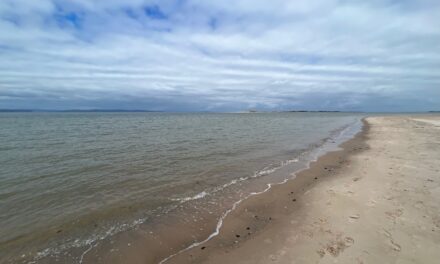The New Year should be a time for resolutions where we wipe the slate of history clean and attempt to be that little bit better than we were during the last twelve months. And looking at the other CSTonline contributions during December, I would hope that one of my resolutions for 2020 would be that I’d write something a bit more meaningful for CSTonline rather than spend another year setting new levels of wrongness.
I mean, look at the fascinating piece by Katrine and Eva about public service drama for young audiences in Denmark which explained to me about junior editors on Klassen (2016-). Or Andreas’ study of the work of Mary Harron via an episode of the brilliant Homicide: Life on the Street (1993-1999). Instead I just indulge in some waffle about [The] Naked City (1958-1959,1960-1963) and soundtrack albums because they happen to take my fancy, but they don’t really lead anywhere. There’s no conclusion. There’s no value. As you’ve seen, they’re just an endless stream of impotent ‘Hey, this is good’ and ‘Gosh – that’s interesting’.
And the fundamental problem – as I understand it from my limited experience of academia – is that I can’t form arguments.
I mean, I understand why we have arguments and how very important they are to ensure that the world isn’t just cluttered up with pointless piles of prose. And I understand how amazing they are when they work. A bit like roller coasters. My friend Sue loves roller coasters… but I just kind of don’t understand the thrill of the process or the need for that outcome.
For almost a decade, nice, smart people have attempted to get me to form arguments, but I keep on getting distracted by the Daily Progress Reports for The Professionals (1977-1981) on Monday 4 August 1980 when Lewis Collins walked off the set and wondering ‘why?’. It’s the little questions. I can’t see the bigger picture… or at times the need for one. I just get curious about the history of television, dive in to try to find answers, and often find something that strikes me as utterly fascinating, but will likely be of neither use nor ornament.
I know that this is partly due to a rather autistic perspective that I have on life which I fundamentally function with most days, but still struggle with on others. It can make working in an office an utter nightmare when needing to understand how people around me are feeling in meetings, but can be extremely good for demonstrating why the postcode population data needs to be improved because there can’t be 2,000 potential customers living in six terraced houses on a street in Glasgow and why another 1,758 similarly suspect postcodes out of 1.7 million should really also be checked in exactly the way that my predecessor didn’t. I see it all as data – and I’ve been trained to look for outliers that will reveal the story contained inside that data.
I’ve tried to explain how I can do facts but not arguments previously in the foreword to Cambridge Scholars’ Impossible Worlds, Impossible Things (2010). Only back then, I don’t think I even knew what arguments were…
A few weeks back, my old friend Neil – one of the first people I met in the 1980s who took the study of popular television seriously – was going back over a topic we first debated some decades ago: which ITV regions took which episodes of the wonderfully stylish thriller series Mission: Impossible (1966-1973, 1988-1990) back in the 1960s before it went over to the BBC in 1970. It never aired in his region – Television West and Wales/Harlech – but he had been aware of it from national newspaper listings. And between us, we had previously assembled a pretty good list of what aired in London via Rediffusion and in the Midlands courtesy of ATV. And we’d foolishly assumed that – as the major regions – that would pretty much nail it.
Living now, here in The Future, we have access to far more information than we had in the 1980s. They’ve invented computers. And computers allow us to harvest data far more quickly, efficiently and thoroughly than we could in The Past.
And to my astonishment it turns out that Mission: Impossible actually made its debut via the south west ITV station Westward (relayed to Channel). One of the smallest of the commercial franchises. Yet the first to undertake a major screening of the first 25 episodes of this new series, airing the series’ pilot on 2 October 1966 a mere fifteen days behind its networking on CBS.
Gosh – that’s interesting!
I’m assuming that at this juncture, ITV stations tended to buy American imports individually; the sale of 30 Mission: Impossible episodes by Desilu to Rediffusion was reported by Variety on 14 September 1966. But they didn’t start their screenings until 19 July 1967, and even then only aired an initial ten as a summer replacement. Yet Westward stuck with the show through to 9 April 1967 – they are the outlier in the data.
So… who at Westward bought this show and had such faith in it even before its Stateside debut? What attracted them? What was the process? Is there any paperwork? Various on-line resources which should really be updated refer me to the South West Film and Television Archive… but it turns out that despite what the Internet tells me, they’ve not been around for a few years and have become part of The Box. But The Box is a bit shut at the moment while relocations happen, so everything is packed away at the Plymouth and West Devon Record Office for the duration.

Fig. 3: Westward Television Chairman Peter Cadbury[i]
And if this was a proper argument, then, around here, you’d find a proper conclusion. Which sort of proves my point.
Unless my argument – which I have successfully demonstrated – is that I cannot form arguments.
Sorry to have broken my resolution within only a thousand words or so. But don’t worry, I can make some new resolutions which are every bit as good as that one…
Andrew Pixley is a retired data developer. For the last 30 years he’s written about almost anything to do with television if people will pay him – and occasionally when they won’t. Sadly, Santa wasn’t able to bring him peace on Earth over Christmas, but he did get his soundtrack CD set for The Invaders (1967-1968) for which is extremely grateful.
[i] Not really, no. It’s Westward’s most famous star, Gus Honeybun.







